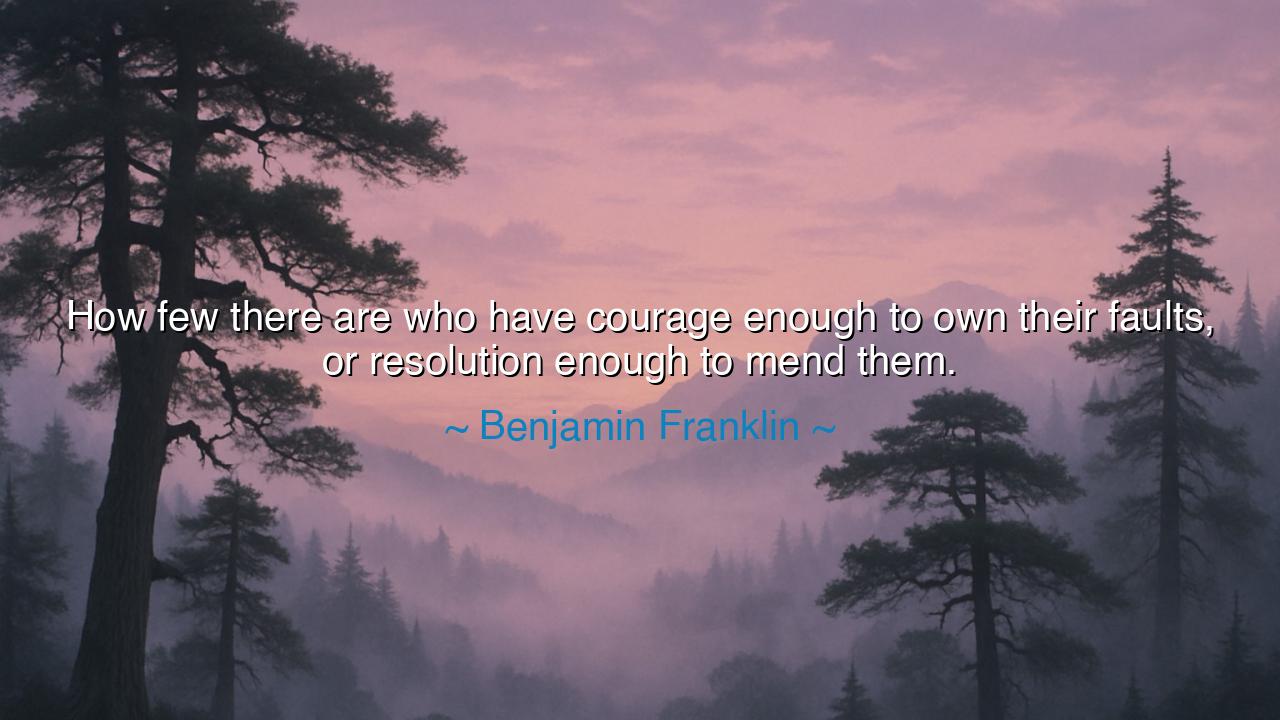
How few there are who have courage enough to own their faults, or
How few there are who have courage enough to own their faults, or resolution enough to mend them.






The wise and venerable Benjamin Franklin, a man who shaped both the mind and destiny of his nation, once wrote: “How few there are who have courage enough to own their faults, or resolution enough to mend them.” These words, though born in the eighteenth century, carry the eternal weight of human truth. They speak not merely to the intellect, but to the conscience—to that hidden battleground within every soul where pride wrestles with humility, and habit contends with virtue. In this saying, Franklin reminds us that true greatness is not measured by the absence of fault, but by the strength to acknowledge and overcome it.
In the world of the ancients, philosophers declared that to “know thyself” was the beginning of wisdom. Yet to know oneself fully requires courage, for to look inward is to face both light and shadow. Many live their whole lives running from that mirror of truth. They blame others for their failings, disguise weakness beneath excuses, and adorn themselves with the illusion of perfection. But Franklin, with the clarity of a sage, warns that this refusal to own one’s faults is the surest path to decay. The brave soul is not the one who never errs, but the one who dares to say, “I have done wrong—and I will do better.”
This wisdom was not born of theory, but of experience. Benjamin Franklin himself was a man who pursued virtue with the rigor of a philosopher and the humility of a craftsman. In his youth, he created a list of thirteen virtues—among them temperance, sincerity, and humility—and sought to practice each with discipline. Yet even he, with all his brilliance, confessed that perfection escaped him. Still, he persisted, noting that though he could never be flawless, he became better for the striving. His words reflect this lifelong struggle: he knew that the first victory in the war for moral improvement is honesty with oneself, and the second is resolution—the steadfast will to change what is wrong once it is seen.
Throughout history, the few who have had the courage to admit their faults and the resolution to mend them have stood as beacons of moral strength. Consider Abraham Lincoln, who in the heat of war and political turmoil often confessed his mistakes openly before his people. When a decision proved unwise, he owned it; when a policy failed, he amended it. This humility did not weaken him—it made him greater, for his honesty earned the trust of millions. Like Franklin, Lincoln understood that it is not infallibility that makes a leader, but integrity: the willingness to confront one’s own errors and to rise wiser from them.
Yet how rare this courage remains. It is easier to hide behind pride than to bear the pain of self-awareness. Easier to defend a mistake than to admit one. Easier to complain of the world than to repair the self. Franklin calls such evasion what it is: cowardice. To own one’s faults demands the bravery of a warrior, for the greatest battle is always within. But resolution—the quiet, persistent effort to change—demands endurance beyond even that. It is not the loud declaration of repentance, but the daily labor of transformation. It is the hand that rebuilds what the heart has broken.
The ancient Stoics taught that the wise man rejoices in correction, for every truth revealed, even about his weakness, brings him closer to freedom. This is the spirit Franklin invokes. He asks us not to despair over imperfection, but to see in it the opportunity for growth. To recognize one’s faults is to open the gate to self-mastery; to act upon that knowledge is to step upon the path of virtue. Without this, all talk of morality is mere wind—fine in sound but empty in substance.
The lesson, then, is clear and timeless: have the courage to see yourself as you are, and the resolution to become what you are meant to be. Do not fear the discovery of your faults; fear only the refusal to face them. Begin each day with honest reflection, asking, “Where have I erred?” and end it with gentle determination: “Tomorrow, I shall do better.” Do not seek perfection in a day; seek progress across a lifetime. For in that daily striving lies true nobility.
So remember, O seeker of wisdom, that Benjamin Franklin’s words are not a reproach, but a call to valor. The path to greatness does not run through denial, but through humility and perseverance. The strong are not those without weakness—they are those who face weakness and transform it into strength. Therefore, let your courage be greater than your pride, and your resolution stronger than your regret. For the one who dares to own his faults and labors to mend them walks not in shame, but in glory—the quiet, eternal glory of the soul that conquers itself.






AAdministratorAdministrator
Welcome, honored guests. Please leave a comment, we will respond soon